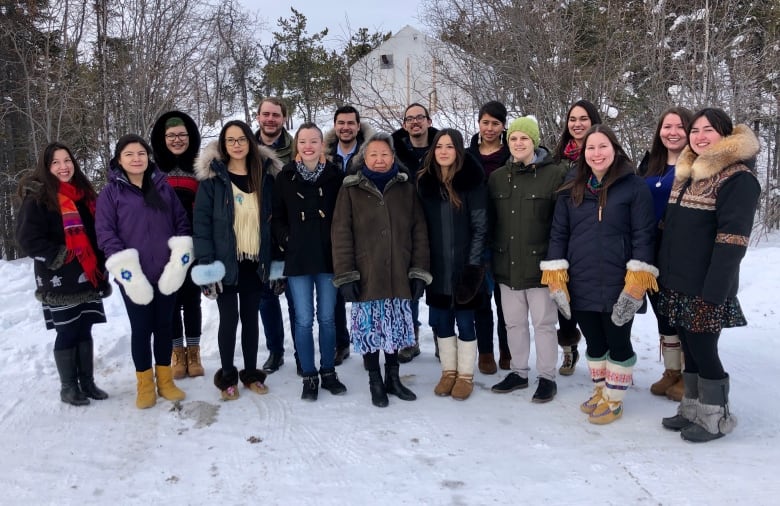Northern youth gather in Yellowknife to create policy change
14 emerging leaders begin 18-month policy and leadership program

Fourteen young people from across the North are in Yellowknife this weekend, hoping to shape policy in their territories and across Canada.
Throughout the 18 month Jane Glassco Northern Fellowship program, they will get training in policy skills as they tackle public policy on an issue important to them.
This is the fifth group of fellows since 2010, and this year they represent places across the North, including Northwest Territories, Yukon, Nunavut, Nunavik, and Nunatsiavut.
'Working for the people'
Jessie Fraser is from Sanikiluaq, Nunavut, and became interested in getting more involved with policy after starting to work with the territory's land claim organization. She said she wants to remind policy makers to work for the people they serve.
"Even though it's a lot of theory and lots of paperwork and thinking about bigger things and not always being able to see how it trickles down and how it affects people in communities — you're still working for the people."
Fraser, who speaks Inuktitut, is passionate about lifting the voices of Inuit, and ensuring they are represented at all levels.

'Necessary and urgent reforms'
Curtis Mesher is also interested in shaping policies that protect Inuit.
Though he grew up in Montreal, his family is originally from Kuujjuaq in Nunavik. Northern policy issues were always a prominent issue for him growing up, he said, with both of his parents working for Makivik Corporation, the land claim organization representing Inuit in Quebec.
So it was no surprise that he became interested in how public policy affects northerners. As a law student, he's focusing his research on the justice system.
"I think that there [are] a lot of necessary and urgent reforms that must be done for our criminal justice system our corrections system in the North," he said.
More specifically, Mesher said he wants to look at the justice system in Nunavik, and hopes to examine how potential reforms could come from traditional approaches to rehabilitation.
Protecting future generations
Another big issue on the table this year is creating policy that protects future generations of northerners.
As a new mother, protecting today's children is a prominent concern for Alyssa Carpenter, originally from Sachs Harbour, N.W.T.
She said she wants to look into suicide prevention, but for her, the issue isn't just about policy — it's also personal.
Carpenter has worked in social work on the front lines of suicide response, and has struggled with depression.
"This is an issue that we know impacts everybody in the North," she said. "It's something that needs to be talked about. It's something that needs to be addressed, and we need to remind the people who are in those policy decisions."

Whitney Johnson-Ward is also hoping to shape policy that protects today's youth, through climate action and wellness programs.
"The land is really important to me and [it is] my home," she said. "Keeping it in a good condition for the next generation is really important."
Johnson-Ward is from Champagne, Yukon and was inspired by the messages she heard from other young people when she took part in the territory's First Nations climate action gathering in Whitehorse earlier this month.
Johnson-Ward said intergenerational knowledge sharing and collaboration is important to taking action against climate change and creating the next generation of ambassadors.
The fellows will have 18 months to work on their policy projects. During that time, they will have three other regional gatherings — opportunities to work together on making lasting policy changes.
with files from John Last